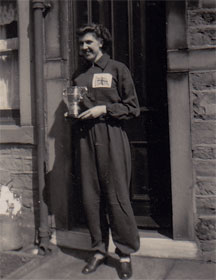Muriel Pletts, Great Britain
Simply sign up to the Life & Arts myFT Digest -- delivered directly to your inbox.
London, 1948
4 x 100 women’s relay
Muriel Pletts, a 17-year-old bookkeeper and sprinter from Bradford, got off the train at King’s Cross in the last week of July, 1948. The only female athlete from the north of England, Pletts was a tall, shy girl – the only northerner in Britain’s female athletics team – hoping to run the 100m relay in London’s postwar Olympics.
First she went to Oxford Street to pick up her white dress and dark blue blazer for the opening ceremony. As ordered, Pletts had brought her own white shoes, nylons and home-made running kit. Then to her accommodation: a nursing school in Victoria. Pletts’ room was a curtained cubicle and a bed, surrounded by other women. “It was very basic. It was like camping.”
Pletts had been to the south before when she competed in the national schools championships on the playing fields at Eton. Her father had been a 400m champion in the Army. “Anywhere we went, if there was a piece of flat ground, I’d say, ‘Come on. Race me, Dad.’” At Eton, Pletts finished the 150m and burst into tears. Her father thought she had lost, but then found out that she had set a new record: 17.4 seconds. “He was pleased that I had done all right. Quietly pleased of course.”
After her victory, Pletts joined the local athletics club. Mainly, though, she just ran. “I ran everywhere. I used to run all the time.” She left school and worked for a textiles exporter. Each morning, Pletts had half a mile to go to the bus stop. Each morning she ran. On Saturdays, she worked, so she had to take half-days of holiday to go to races. “When it came to 1948, my holidays were the Olympic Games.”
The opening ceremony was at Wembley Stadium. It was the hottest day in London since 1911. Pletts stood for hours in the sun with the other British athletes, the last to go in. They were given packed lunches in cardboard boxes. As John Mark, a Cambridge student chosen for his looks, ran in to light the Olympic torch, 7,000 pigeons were released as symbols of peace. Mess rained down.
Pletts had a free travel pass and went to Wembley each day. She watched the Czech runner Emil Zátopek staggering round as the crowd chanted his name, and saw Holland’s Fanny Blankers-Koen, “The Flying Housewife”, beat three of her British team mates to gold medals. There was nowhere for her to train, so she ran wherever she went. Early in the week, she felt a muscle twinge in her leg.

The women’s relay was on Saturday, August 7. With her stamina, Pletts was chosen to run the second leg. She remembers trying not to let anyone see that she was limping. “It did hurt.” The final was at 4.40pm. “You’re waiting for them to come towards you and then you do your bit and you pass on the baton.” There was a fumble at the last handover, and Britain finished fourth, by 0.2 seconds.
“I mean, fourth is the worst place to finish,” says Pletts, who is now 81, and a straight, unfussy Yorkshirewoman. “If you finish fifth, well that’s all right, but fourth, you’ve just narrowly missed doing what you should have done. I really can’t remember what my feelings were as we came off the track. I suppose your thoughts turn to the fact that, well, you’ve got the train to catch. You’re going back home again.”
Pletts was in work on the Monday. Another muscle injury kept her out of the 1952 Olympics. She met her husband, Geoffrey Hearnshaw, at church and had a daughter, Sue, in 1961. Twenty-three years later, Sue Hearnshaw won an Olympic bronze medal for Great Britain in the long jump in Los Angeles and brought it back to her parents in Yorkshire, who had been watching on television. “We were sat here, quietly proud.”
……………………………………………………………..
Arie Gluck, Israel: http://on.ft.com/KoHXKH
Ben Ainslie, Great Britain: http://on.ft.com/KoHZT3
Billy Mills, USA: http://on.ft.com/KoI3SP
Carla Marangoni, Italy: http://on.ft.com/KoI8Wn
Derek Redmond, Great Britain: http://on.ft.com/MRP7wg
Ellie Simmonds, Great Britain: http://on.ft.com/MRQICi
Gezahegne Abera, Ethiopia: http://on.ft.com/MRQGKJ
Ingeborg Sjöqvist, Sweden: http://on.ft.com/KoJ4tS
John Carlos, USA: http://on.ft.com/KoJ3pU
Kenneth Matthews, Great Britain: http://on.ft.com/KoJ0un
Kip Keino, Kenya: http://on.ft.com/KoIYT2
Larisa Latynina, USSR: http://on.ft.com/MRQmfb
Lawrence Lemieux, Canada: http://on.ft.com/KoIRqG
Margaret Maughan, Great Britain: http://on.ft.com/MRQg7c
Mark Spitz, USA: http://on.ft.com/KoIOuW
Michael Johnson, USA: http://on.ft.com/MRQ9sc
Nadia Comaneci, Romania: http://on.ft.com/MRPYxh
Nawal el-Moutawakel, Morocco: http://on.ft.com/MRPRS4
Odlanier Solís, Cuba: http://on.ft.com/KoIBIj
Olga Fikotová, Czechoslovakia: http://on.ft.com/KoIrRg
Sándor Tarics, Hungary: http://on.ft.com/MRPvuY
Sarah English/Anthea Stewart, Patricia Davies, Zimbabwe: http://on.ft.com/KoIigC
Comments